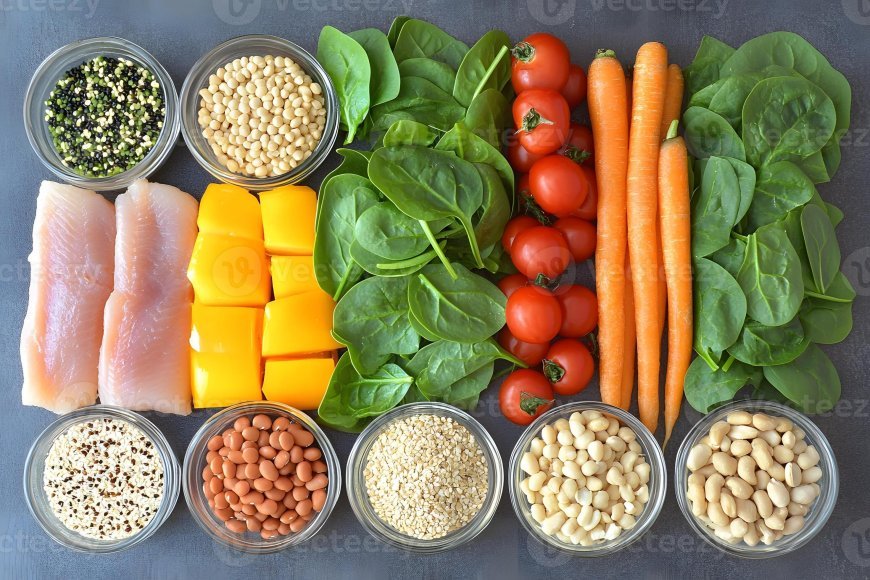The Ultimate Guide to Gut Health: Foods, Habits & Tips
"Holistic Digestive Wellness Through Nutrition" Would you like a few more word sets to choose from?
Introduction:
Your gut plays a major role in your overall health, far beyond just digesting food. A healthy gut influences your immune system, mood, weight, skin, and even brain function. With poor gut health being linked to various diseases, understanding how to take care of your digestive system is crucial. In this ultimate guide, we’ll explore the importance of gut health, the best foods to support it, daily habits to maintain it, and actionable tips to improve your digestive wellness naturally.

What is Gut Health and Why Does It Matter?
Gut health refers to the balance and function of the bacteria and microorganisms living in your digestive tract, collectively known as the gut microbiome. When this ecosystem is healthy and balanced, your digestion runs smoothly, nutrients are properly absorbed, and your body can fight off pathogens more effectively.

Signs of Poor Gut Health:
-
Frequent bloating or gas
-
Constipation or diarrhea
-
Fatigue or brain fog
-
Skin problems (acne, eczema)
-
Food intolerances or sensitivities
-
Unexplained weight gain or loss
Top 7 Gut-Friendly Foods
1. Yogurt
It is Rich in probiotics (live beneficial bacteria), and yogurt helps restore and maintain a healthy balance of microbes in the gut. Choose plain, unsweetened varieties with "live and active cultures."
Benefits:
-
Boosts digestive function
-
Strengthens the immune system
-
Enhances nutrient absorption
2. Kefir
This fermented dairy drink is like yogurt but thinner and even richer in probiotics. It also contains several strains of good bacteria and yeast.
Benefits:
-
Improves gut flora diversity
-
Reduces bloating
-
Supports immune health
3. Sauerkraut & Kimchi
These fermented vegetables are packed with probiotics, fiber, and essential nutrients. Kimchi also contains antioxidants and anti-inflammatory compounds.
Benefits:
-
Aids digestion
-
Reduces inflammation
-
Enhances gut flora balance
4. Bananas
Bananas are a great source of prebiotics—food for your gut bacteria. They also help normalize bowel function and soothe the digestive tract.
Benefits:
-
Promotes regularity
-
Feed good gut bacteria
-
Soothes the stomach lining
5. Garlic and Onions
Both are natural prebiotics rich in inulin, which encourages the growth of healthy bacteria in the gut.
Benefits:
-
Enhances microbial balance
-
Boosts immunity
-
Acts as a natural antibiotic
6. Oats
Whole oats are rich in beta-glucan fiber and act as a prebiotic to promote the growth of healthy gut bacteria.
Benefits:
-
Supports bowel regularity
-
Lowers cholesterol
-
Improves microbial diversity
7. Bone Broth
Bone broth contains gelatin, collagen, and amino acids that support the lining of your gut and aid in healing leaky gut syndrome.
Benefits:
- Repair the gut lining
- Reduces inflammation
- Supports digestion and absorption

Healthy Habits for a Happy Gut
1. Eat a Fiber-Rich Diet. Fiber feeds your good gut bacteria and helps maintain regular digestion. Include fruits, vegetables, legumes, and whole grains daily.
2. Stay Hydrated.. Water aids digestion and nutrient absorption. Aim for at least 8–10 glasses per day.
3. Limit Processed Foods & Sugar. Highly processed foods and added sugars can damage your gut lining and feed harmful bacteria.
4. Manage Stress: Chronic stress disrupts the gut-brain connection. Practice yoga, deep breathing, or meditation to stay balanced.
5. Get Quality Sleep. Poor sleep negatively affects gut microbiota. Aim for 7–9 hours of uninterrupted rest each night.
6. Exercise Regularly. Movement promotes healthy digestion and improves the diversity of gut microbes.
7. Avoid Unnecessary Antibiotics Antibiotics can wipe out both good and bad bacteria. Only take them when prescribed, and follow up with probiotics.
Pro Tips for Improving Gut Health Naturally
-
Chew Your Food Thoroughly: This aids digestion and signals your body to produce digestive enzymes.
-
Try Intermittent Fasting: Giving your gut a rest can help improve its function.
-
Introduce Fermented Foods Slowly: Too much too quickly can cause discomfort—start small.
-
Supplement Wisely: Consider taking a high-quality probiotic or digestive enzyme supplement if needed.
-
Track Your Symptoms: Keep a food and symptom journal to identify food intolerances.

Conclusion:
A healthy gut is foundational to a healthy life. By eating gut-friendly foods, practicing good habits, and avoiding common gut disruptors, you can support your digestive system and improve your energy, mood, and immunity. Remember, change starts with small, consistent actions. Take care of your gut—and it will take care of you.

Frequently Asked Questions (FAQ)
1. What is the gut microbiome?
The gut microbiome is a community of trillions of microorganisms—including bacteria, fungi, and viruses—that live in your digestive tract and play a vital role in digestion, immunity, and overall health.
2. How can I tell if I have an unhealthy gut?
Common signs include bloating, gas, constipation, diarrhea, fatigue, skin irritation, frequent illness, and food intolerances.
3. Are probiotics and prebiotics the same?
No. Probiotics are live beneficial bacteria found in fermented foods. Prebiotics are types of fiber that feed those good bacteria.
4. Can gut health affect mental health?
Yes! The gut-brain axis links your digestive system and brain. An unhealthy gut can contribute to mood disorders like anxiety and depression.
5. What are the best probiotic foods?
Top sources include yogurt, kefir, kimchi, sauerkraut, miso, and kombucha.
6. How long does it take to improve gut health?
You may start noticing changes within a few days to weeks. Long-term benefits require consistency over months.
7. Should I take probiotic supplements?
Supplements can help, but should not replace a balanced diet. Consult your doctor to find what’s right for you.
8. Does gut health affect weight loss?
Yes. A healthy gut improves metabolism, reduces inflammation, and balances hormones related to hunger and fat storage.
9. Can children and seniors benefit from gut-friendly foods?
Absolutely. A diverse, fiber-rich diet supports gut health at all ages.
10. Is bone broth good for vegetarians or vegans?
Vegetarians can use plant-based alternatives like mushroom broth or seaweed soup. While not identical, they offer gut-friendly minerals and compounds.
What's Your Reaction?








